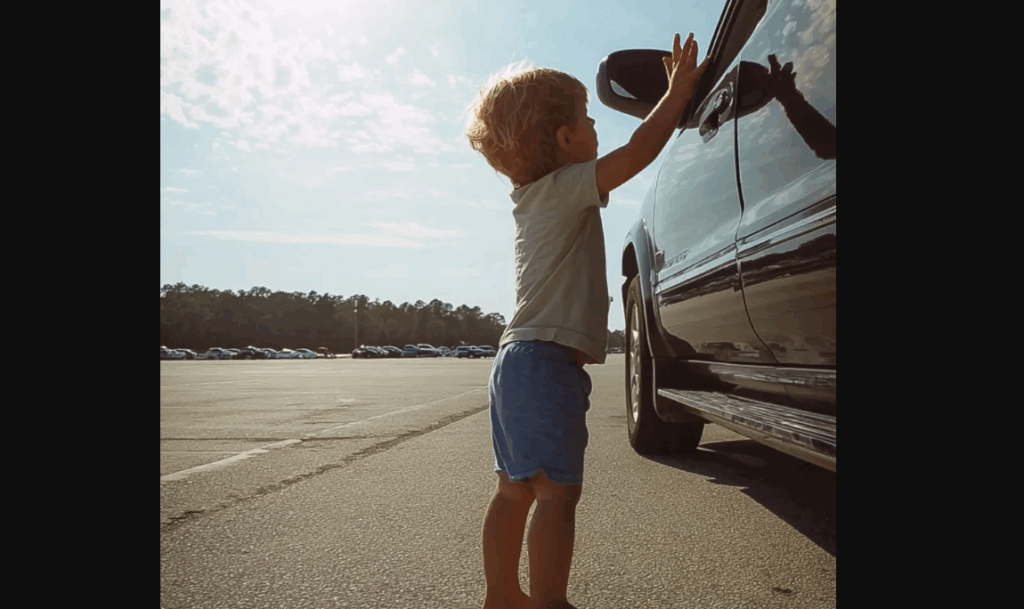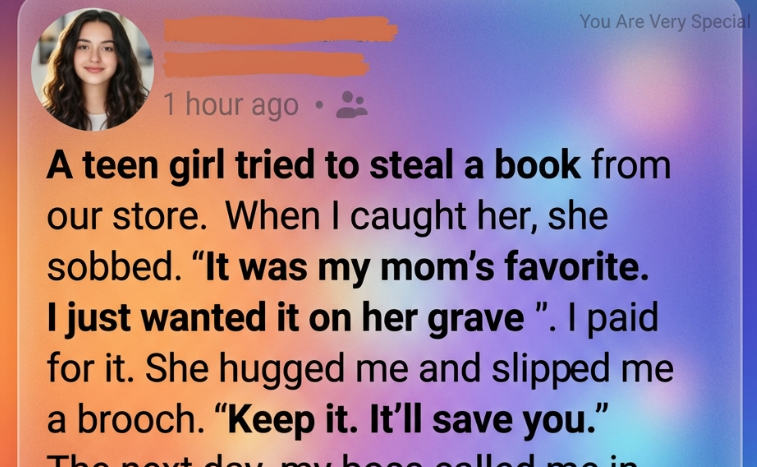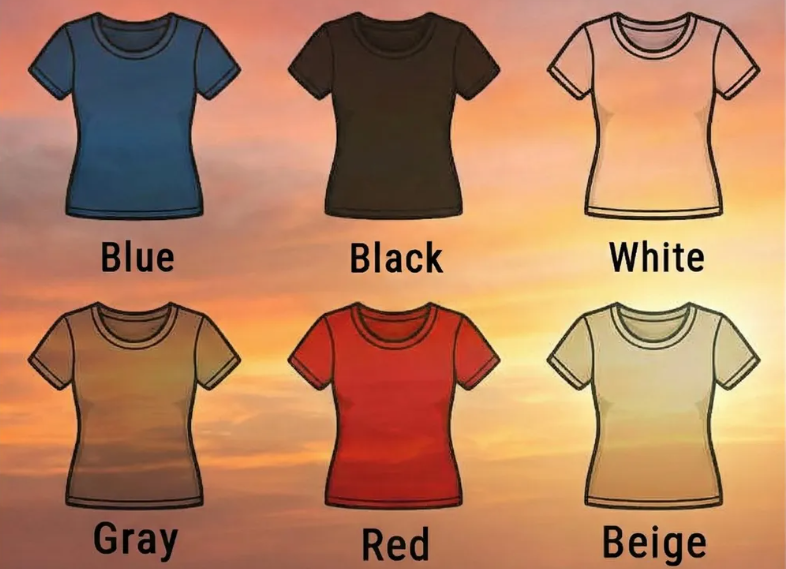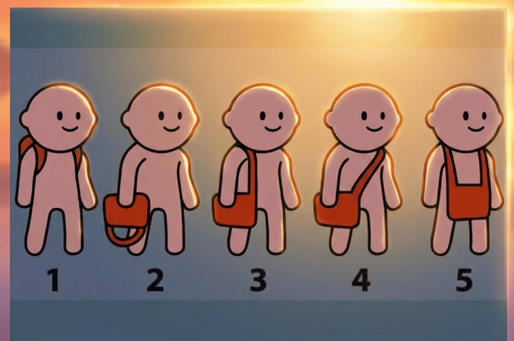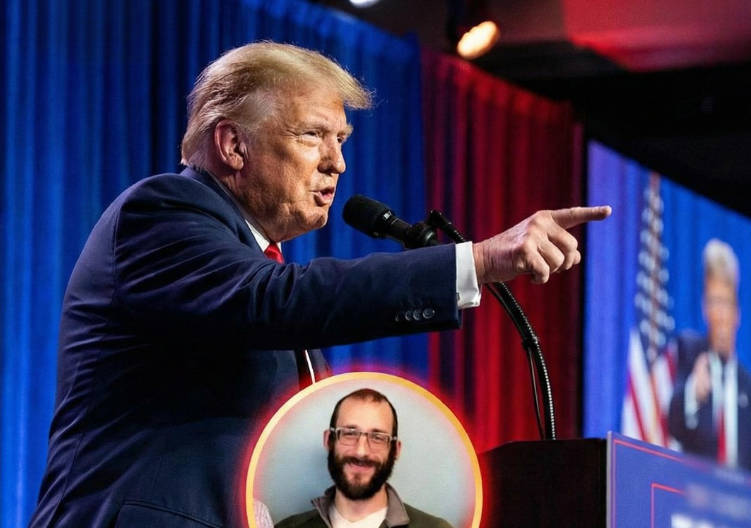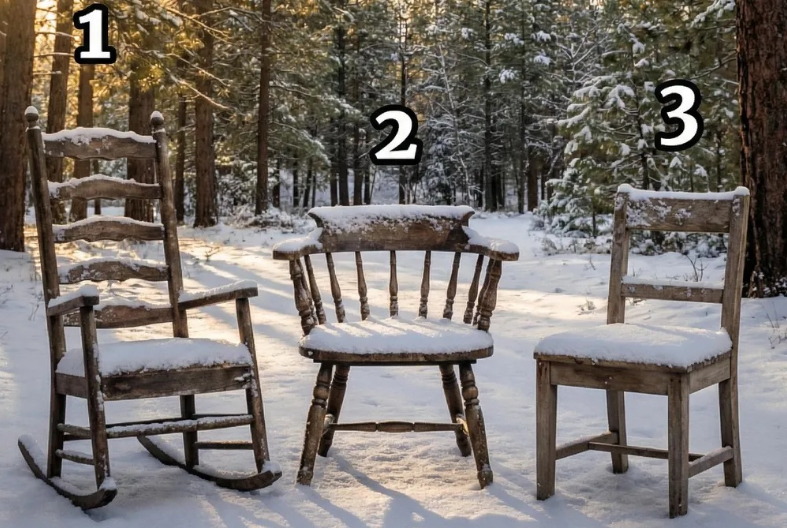He stood beside a black sedan, his tiny body shaking with sobs.
No shoes, red skin from the sun, small hands gripping the door handle as if it might open if he cried hard enough.
I looked around. No adults searching. No one calling his name.
I knelt beside him. “Hello there, where are your parents?”
His sobs deepened. “I want to return inside!”
“Return where?” I asked softly.
He pointed to the car. “The movie! I want to return into the movie!”
Assuming he meant the theater down the block, I checked the car. Locked. Inside was empty—no toys, no car seat.
Lifting him into my arms, I walked toward the theater. “Who brought you here?” I asked.
He hesitated. “My other dad.”
I stopped. “Other dad?”
He nodded. “The one who does not speak aloud.”
Before I could respond, a mall security guard arrived.
I explained everything. We searched the mall—food court, play area, security office—but every parent shook their head. “Not mine.”
Then we checked the parking lot footage.
That’s when things became unusual.
No one walked him in. No one dropped him off.
One second, the lot was empty—next second, there he was.
Earl, the guard, squinted. “Look… the shadow.”
We leaned in. The boy’s shadow was not alone. It held another hand.
I stared, speechless. Earl replayed the footage three times. Always the same: one frame empty, the next frame showed the barefoot boy.
However, his shadow reached sideways, fingers curled around something—or someone—we could not see.
I asked the boy his name. It sounded like “Eli.” Or “Elias.”
“Do you know where home is?” I asked.
He shook his head.
The police arrived. They watched the footage and questioned him, but he remained quiet.
When he did speak, it was about the “other dad.” They took him to the hospital and notified social services. I left my number in case he remembered anything.
I believed that was the conclusion.
Two nights later, I heard tapping on my bedroom window at 2 AM.
Three gentle knocks.
I pulled the curtain aside—and there he was. Eli. Standing barefoot in the dewy grass. Still in that same yellow T-shirt. His hair was damp, perhaps from sweat or fog.
I rushed outside, heart pounding. “Eli?! How did you get here?”
He did not answer. He held up a toy car, one of those small metal ones, and pressed it into my hand. It was warm.
“I do not like the hospital,” he whispered. “They will not let me speak with my dad.”
“Which one?” I asked.
“The quiet one.”
I brought him inside, called the police again.
They were stunned—he’d vanished from the hospital hours earlier. Security footage showed him asleep in his bed, then nothing. The door never opened.
One officer pulled me aside. “You mentioned a ‘dad who does not speak aloud’?
Years ago, different town, the same thing. A child vanished, returned stating that. Then disappeared again.”
I could not sleep after that. I kept thinking of his shadow. Of how he… appeared.
I searched online—news stories, forums, anything unusual. I found a post about a girl who appeared in a bookstore parking lot.
She stated her “silent mommy” brought her. Two weeks later, she vanished from a locked foster home.
Always the same pattern: strange appearance, mention of a silent parent, then disappearance.
The next day, I visited the hospital. I sought more information. The staff were tight-lipped, citing privacy laws. I left my number again. Asked them to inform the caseworker I wished to help.
That I was willing to foster, if necessary.
On my way out, I passed a janitor with a cart full of rags and bleach bottles. He looked up at me suddenly and said, “That boy’s not lost. He’s searching.”
“Searching for what?” I asked.
But he was already gone.
Three nights later, I heard laughter—high and echoing through my hallway.
I grabbed a flashlight and gently opened the bedroom door.
Eli was there, sitting cross-legged on the floor, stacking books into a tower.
He looked up at me. Smiled. “He brought me back again.”
I knelt down. “Who, Eli? The quiet dad?”
He nodded. “He says you’re safe. Like the lady before.”
“What lady?”
Eli thought for a second. “The one who sings to her plants.”
My blood ran cold. That was my late aunt Mary. She raised me after my parents died in a car crash. She used to hum lullabies to her garden, swearing they helped the roses bloom. She died six years ago.
“There’s no way you know that,” I whispered.
“He showed me,” Eli said simply.
I didn’t call the police this time. I couldn’t. I didn’t know what to say.
Instead, I made pancakes.
We sat at the kitchen table, him smiling between bites, like nothing was strange.
“You know I cannot keep you, right?” I said gently.
“I know. He wanted you to see.”
“See what?”
“That not all lost things are accidents.”
He handed me a folded piece of paper. It was a child’s drawing—stick figures holding hands under a big sun. One was me. One was him. The third had no face. An outline, and long arms.
I kept that drawing in my wallet from then on.
Eli vanished again a week later.
One moment, he was playing fetch with my neighbor’s dog. The next, gone.
No sign. No sound. The toy car left on the back steps.
But this time, I wasn’t scared.
Because something told me he wasn’t lost.
He was… in motion. Like he was part of something bigger. A pattern we were not meant to fully understand.
I started volunteering at a youth shelter after that. Helping out wherever I could. Telling myself it was a way to give back. But deep down, I knew I was waiting.
For another knock.
Another shadow with a hand reaching out.
Six months later, it came.
A girl named Sophie. Six years old. Found barefoot by a highway underpass, holding a wilted sunflower and a key with no door.
She said her “mirror daddy” left her there.
I took one look at her and knew.
She had Eli’s eyes.
When I showed her the drawing he’d made, she pointed at the faceless figure and said, “He hums like the fridge.”
Now I keep the guest room made up. Always have a plate of fruit out, in case. I don’t ask questions anymore. I simply listen.
Because sometimes, what we call missing isn’t about being lost at all.
It’s about being delivered.
From pain.
From fear.
From whatever life tried to steal too early.
And sometimes, if we’re lucky, we’re chosen to help carry them for a little while.
Perhaps that’s what the quiet dad is doing—walking them to people who’ll see them. Hear them. Hold them for however long is needed.
Even for one more night.
So now I ask you—if you saw a barefoot child crying alone in a parking lot, would you stop? Or would you assume someone else would handle it?
Perhaps next time… someone will be waiting for you.
If this story moved you, please like it and share it. You never know who might need to hear it.
